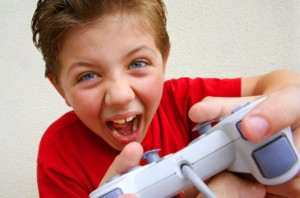 The best way to manage child screen rage is to avoid it in the first place.
The best way to manage child screen rage is to avoid it in the first place.
Easier said than done, we know!
Here are some tips on how to promote healthy screen time in your household so both you and your children are clear about the expectations and boundaries when using electronic devices such as TVs, computers, video games, phones or tablets.
- When introducing screen time to a young child, consider how it will be used, when it can be used to best assist your family dynamic and routine, and set time frames and conditions at the very early stages so that children know the rules and boundaries. It is also useful to determine the purpose of computer or device use: is it for homework, social networking or entertainment?
- Avoid using electronic devices with babies and young toddlers as sitting still looking at a green, even those proposing to be educational, limits the opportunities to explore the child’s real immediate world through movement (crawling, walking), play, using the full range of eye movement, and engaging in social interactions with others (Australian Government Department of Health and Aging, 2010).
- Use other motivators – Try to offer rewards and punishments that are unrelated to screen use as too much focus on screen time can increase a child’s interest and desire to use screens. If you must use TV/computer/iPad time as a motivator, consider offering it as just one of several rewards your kids can choose from.
- Set up time limits for use and help with transitions – having these limits clearly set out BEFORE screen use will reduce the likelihood of arguments later. Helping kids move onto another activity WITH you, initially, will assist them to focus on the next thing rather than get stuck on the idea of needing the screen, e.g. “C’mon let’s go brush your teeth together, then you can pick a story”.
- Help kids keep track of the time frames and give warnings before the time frames end. Use visual and/or auditory timers, alarms, daily routine lists, or refer to daily events like “now until dinner”. Some devices allow you to set time periods for use or there are even Apps available to allow remote shutdown of devices.
- Don’t engage in discussion, arguing or attempted persuading when time’s done. Children and adolescents need boundaries, even when they don’t like them, and if you stick to those boundaries, kids learn pretty quickly that screen rage doesn’t change your mind.
- Remove electronic devices from easy access to kids during the night or at inappropriate times if they are likely to be tempted- putting all devices on charge in a certain area at a certain time for example, and turning off the TV at a certain time.
- Get active – some of the greatest concerns about screen use in children is in regard to the sedentary nature of activities associated with screens (TV being the worst offender)(Okely, et al., 2012) but many devices these days allow activity and social play, such as Wii and Xbox games. So encourage kids to be active during screen use – play tennis or a soccer game, or white water rafting….

- Find other things your kids love to do, with you, and alone. Help kids find alternatives to the PS4 or the DVD player that they’ll like just as much both indoors and outside. These activities can be quiet (e.g. reading) or active (e.g. jumping on trampoline).
- Establish device free times and spaces where screens including the TV are turned off, such as mealtimes and in bed. This means parents have to stay off their screens too!
- Challenge your family to have no screen time for one week. Replace that time with family time, time with friends, or fun activities.
Screen rage is a phenomenon that is becoming all-too-familiar in modern families. Setting up expectations and clear guidelines about appropriate screen use is the best way to prevent the emotional and behavioural meltdowns our kids experience when the end of screen time is imposed by adults.
For babies, toddlers and younger children, parents determine the boundaries around screen use and ensure they adhered to. As children grow older, their use of screens increases as they add academic and social aspects in addition to entertainment.
Parents should still monitor screen use with older children and adolescents, however, you can involve your children in setting the boundaries and expectations so they feel they have contributed to the screen use rules and are more likely to follow them.
If screen rage continues to be an issue within your family, seek professional help. We offer a free phone consultation with our psychologists, and individualised psychological support to best meet the needs of you and your children.
